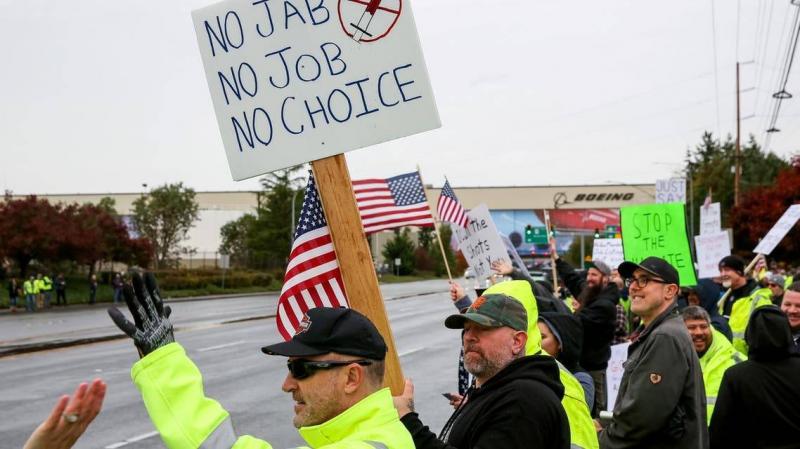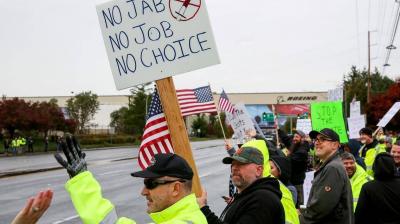A major trade group in the United States has warned the White House that President Joe Biden's vaccination mandate will force employers to lay off thousands of workers, worsening the supply chain crisis significantly. The National Association of Wholesalers and Distributors, an influential trade group representing almost 6 million workers, urged the U.S. administration to postpone the December 8 deadline for federal contractor employees to get vaccinated.
Days ago, President Biden stated that the vaccination mandate against COVID-19 has successfully encouraged Americans to get vaccinated, but he criticized the persistently high levels of unvaccinated individuals. He noted, "The vaccination requirements we began implementing this summer are working successfully, and the Department of Labor's vaccination requirement for companies will be announced soon." The Biden administration clarified that the vaccination rate increased by more than 20% after institutions adopted mandatory vaccination policies in recent months, following Biden's decision in July that required federal employees to be vaccinated or undergo weekly testing, before making vaccination the sole requirement in September.
However, the president added: "The number of unvaccinated individuals has decreased to 66 million, which is still an unacceptably high number... We cannot allow this." Some Republicans, including Texas Governor Greg Abbott, have rejected the vaccination mandate, with Abbott issuing an executive order preventing companies in the state from enforcing vaccination.
At the same time, the National Association of Wholesalers and Distributors warned that "if dozens or hundreds of thousands of employees are laid off just two weeks before Christmas... the outcome could be catastrophic for new unemployed workers and their families and the U.S. economy." Members of the trade group include grocers, lumber suppliers, flower sellers, beer and wine distributors, and various other distributors.
The executive order signed by President Biden last month requires employees of contractors working with the federal government to be vaccinated against COVID-19, with no option for regular testing. This order, which also applies to subcontractors, aims to prevent the spread of the coronavirus and further economic losses in the United States. To avoid a "disaster," the association urged President Biden to provide alternatives, including testing, and consider a "short-term delay" in implementing the vaccination mandate to avoid further disruptions in the supply chains.
Recently, the U.S. Department of Labor reported that the rate of employees quitting their jobs hit a record level in August, with an increasing number of bar, restaurant, and retail employees resigning en masse. The number of employees who resigned reached a historic high of 4.3 million, marking an increase in the resignation rate to 2.9%, up by 242,000 from 2.7% in July, according to the department's Job Opportunities and Labor Turnover Survey. This rate, measured against total employment, is the highest in the data series dating back to December 2000.
The National Association of Wholesalers and Distributors revealed that supply chains are currently under severe stress due to significant port congestion, a shortage of truck drivers, and a lack of storage containers. This crisis has led to increased prices for consumers, limiting shopping options and causing significant delays. Some employees across the distribution sector, for various reasons, refuse to get vaccinated, with their companies risking termination of thousands of workers. The association stated that many of these workers have directly and unambiguously informed their employers that they would "choose to be laid off" if required to get vaccinated. It noted that these workers disproportionately belong to communities of color and tend to be low-income.
The association continued: "The already vulnerable supply chain will face additional pressure during the busiest times of the year, and the tight labor market will make it extremely difficult to replace laid-off employees." The association added: "In December, many companies will not be able to continue moving products through their warehouses and distribution centers to meet increasing consumer demand if they are forced to lay off these essential workers."




